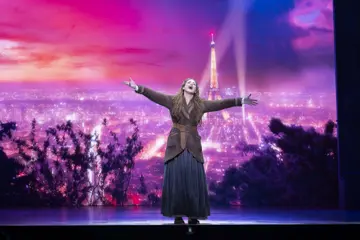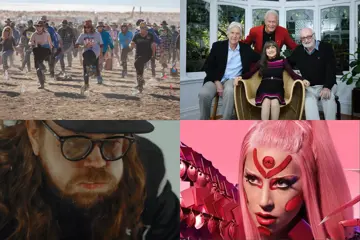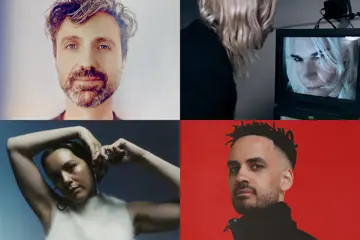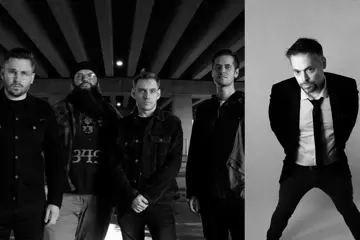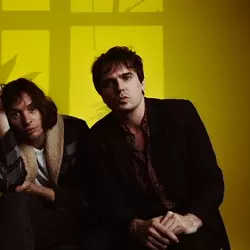 Deep Sea Arcade
Deep Sea ArcadeDeep Sea Arcade had a plan. They were going to go over to Europe for a few months, play at a festival in the Netherlands, then spend some time in London recording the new album with producer Dan Grech-Margueray. Maybe they'd go to a few gigs, maybe they'd get a bit of writing done, but in general they would just hang out with other musos and get a sense of how the poms did things. That was the plan, anyway. Things didn't exactly work out that way.
“We played one festival and then suddenly we were put on a gazillion others,” Nic McKenzie, lead vocalist of Deep Sea Arcade, says. “From going over in March and playing in the freezing cold this one festival, we got booked on Secret Garden Party, Wilderness Festival, The Great Escape, and six or seven other UK festivals.” He starts listing: five more festival shows in the Netherlands, some other smaller shows, headline shows in London, a few gigs in London, a few up north. It's an impressive list.
Fortunately, and despite the chaos, they did manage to get some writing done. Many of the songs they played at those gigs were new ones, allowing the band to road-test new material and figure out what was resonating with the crowds over there, while becoming comfortable with the fresh songs ahead of their return home.
Meanwhile, they discovered a few aspects of British culture they didn't necessarily expect. “Their attention to detail on everything – it's almost autistic,” McKenzie says. “First of all, they're very interested in the way that they look. Bands over there will practice their songs for like two years. They'll get the look down to a T, and they'll work on the songs down to this precise thing, and they'll get up on stage and it'll all be very precise. And they've got this academic knowledge of music history.”
Don't miss a beat with our FREE daily newsletter
“I mean, lots of the bands over there, they don't go to the pub, because they're too poor,” he continues. “Like, even quite successful bands are pretty poor over there. What they'll do on the weekend is just go to each others' houses and they'll sit around. And they've got the off license there so you can buy a beer for a pound. And they'll just sit around drinking beer and on YouTube, trying to outdo each other with who can find the most obscure '60s rock 'n' roll B-side that no one's ever heard of. And they'll do that the whole weekend. They'll stay up from Friday doing that until Tuesday.”
This all sounds incredibly unglamorous, pretty freaking nerdy, and not at all in line with the cocaine and hookers usually associated with a rock n' roll lifestyle. McKenzie doesn't seem to mind though.
“I felt like I went to music university,” he says. “I learned a lot about '60s music.”
Which is fortunate because, while most bands tip their hats in the general direction of '60s music, Deep Sea Arcade positively wallow in it. The band is psychedelic Beatles all over again – heavy on the melodies, swirling guitar licks, soft vocals, plenty of reverb.
“I'm drawn to it,” McKenzie says simply. “All those harmonies and those chord progressions. They are something I get so much pleasure out of.”
He says he finds lots of eras of music compelling, but the '60s had the magic of genesis to it. “It's where it all started,” McKenzie explains. “And whenever there's a movement in music, it always nods its hat to that. Like, if that's in your DNA you can go anywhere. We often go off on tangents and we certainly will be going off on tangents with this new record but I feel like if you have that in your DNA, it's like you know the rules so you can break them. You can kind of go anywhere with that knowledge.”
“A lot of stuff that we're doing at the moment, there's definitely a nod to '90s shoegaze,” McKenzie says. “We also have a bit of glammy stuff going on. The new record is very interested in instrumental hooks and riffs. And vocal riffs as well. And there's a lot of electronic stuff in there, and stuff that's more aware of beats, especially, and not only modern beats but '90s beats as well, which has always been an influence for us. But whether it's a big guitar riff hook, or if it's a synth hook, there are a lot of instrumental things that go off on tangents. There's a feeling and there's a mood and there's a place that it's coming from but I couldn't necessarily describe that. I couldn't give you a whole bunch of references and say that's where we're going. It's a development of our sound.”





